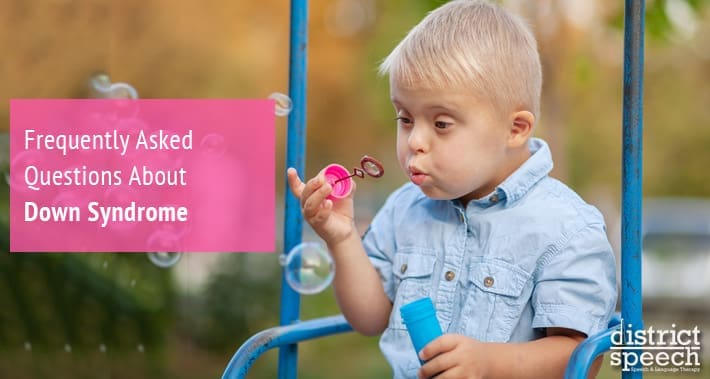
Have you recently found out that your child has Down syndrome?
Or maybe you have a child with Down syndrome and are hoping to know more about their condition so you can better help them?
While this diagnosis can feel overwhelming at first, it’s important to realize that your child with Down syndrome has every chance to have a fulfilling and satisfying life.
These children will grow up to have the same kinds of aspirations and desires as anyone else their age.
The best thing you can do for your child with Down syndrome is ensuring they have support from an early age in the areas of development they may have particular struggles in.
This may include various physical therapies, as well as speech therapy.
If your child is dealing with speech difficulties specifically, you can click here to check out speech therapy treatments for children with Down syndrome.
If you’d like to know more about Down syndrome, keep reading as we go over some frequently asked questions.
What Is Down Syndrome?
Down syndrome is a genetic condition characterized by delays in physical and intellectual development.
Instead of having the usual 46 chromosomes, people with Down syndrome have 47.
Down syndrome is one of the most common chromosomal disorders.
An English doctor named John Langdon Down was the first to categorize the common features that occur in people with Down syndrome.
It’s most important to remember that people with Down syndrome are more similar than different from those who do not have it.
What Causes Down Syndrome?
While the exact cause of Down syndrome is unknown, here’s what we do know.
An error occurs in cell division called nondisjunction.
While what leads to this error is not known, we do know that it occurs at conception and is not related to anything you do during pregnancy.
There are different types of Down syndrome: in Mosaic translocation Down syndrome some but not all cells have a copy of the 21st chromosome.
The chance of Down syndrome occurring increases with the mother’s age during pregnancy.
Down syndrome is not related to factors like socioeconomic status, ethnicity, or nationality.
How Common Is Down Syndrome?
Down syndrome occurs in about 1 in 791 live births and is the most common chromosomal disorder.
The occurrence of Down syndrome in the general population is not actually known.
Recently, the life expectancy of people with Down syndrome has dramatically increased, which means that the population is growing.
Because of flaws in how we calculate population and incidence of Down syndrome, it is impossible to know what their population currently is.
However, some estimates put the world population at more than 6 million people.
How Does Down Syndrome Affect Learning?
People with Down syndrome do experience developmental delays.
However, it’s important to remember that they have many talents and skills, as well.
Mild to moderate learning impairments are to be expected in children with Down syndrome.
Some children will have more specific needs than others.
Specialized programs may be needed if your child has significant difficulties, including speech therapy for learning and reading impairments, but it’s important to remember that children with Down syndrome are more similar than different to other children.
What Complications Are Linked With Down Syndrome?
Almost 40% of children with Down syndrome will have congenital heart defects.
Sleep apnea and Alzheimer’s disease are more common in people with Down syndrome, along with a higher incidence of infection and respiratory problems.
There is some evidence that seizures, Celiac disease, autism spectrum disorder, and childhood leukemia are also more likely to occur.
However, more research is needed to assess the actual frequency of these complications.

How Does Down Syndrome Affect Your Child’s Speech?
Down syndrome may affect how easy it is for your child to be understood.
Speech requires strength, timing, and coordination.
Children with Down syndrome may have trouble with the coordination to control all the systems involved in creating speech.
Specific problems with speech may include dropping off the ending sound of a word.
Down syndrome may cause an articulation disorder due to low oral facial muscle tone.
For the same reason, they may also need speech therapy for feeding and swallowing disorders.
There are many things both you and a pediatric speech therapist nearby can do to encourage your child’s speech development, though.
What Does A Speech Therapist Do For Children With Down Syndrome?
Early intervention speech therapy strategies for your child with Down syndrome are key.
This is especially important in the first five years of their life.
A speech and language therapist will be familiar with the specific needs of your child and be able to help guide them.
Oral motor skills can be improved while vocabulary is built.
If your child has hearing issues your speech therapist will take those into account.
Even feeding themselves, reading, and writing can be addressed with a speech therapist.
Ideally, your speech therapist will help develop strategies that you and your child can practice at home.
Book Your Appointment With District Speech Today
Are you looking forward to helping your child with Down syndrome navigate their constantly developing world?
Early intervention therapies are key tools to help your child experience a fulfilling life.
If speech therapy sounds like the right fit for you, don’t hesitate.
Book your appointment with District Speech today.
1300 I St NW, Suite 400 E,
Washington, DC 20005
- https://g.page/districtspeech
District Speech and Language Therapy specializes in speech therapy, physical therapy, and occupational therapy solutions, for both children and adults, in the Washington D.C and the Arlington Virginia areas.